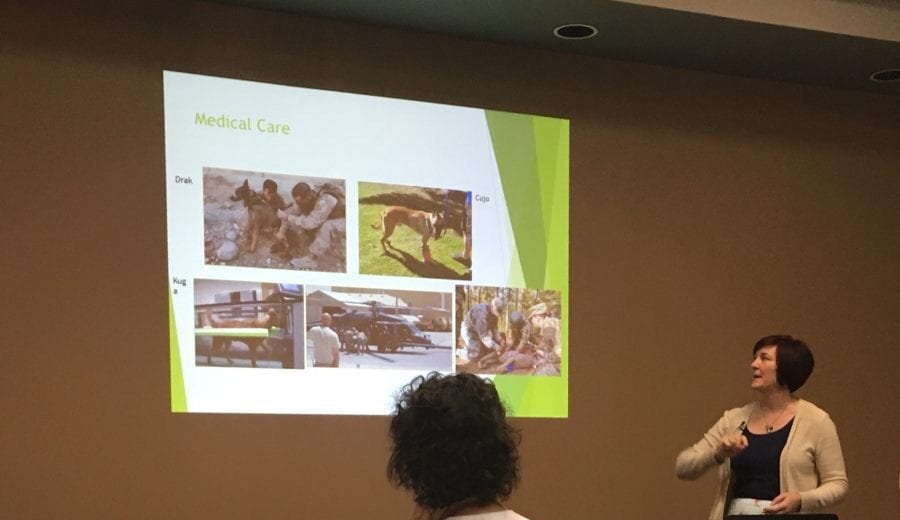Service animals aid returning military

Grace Goodacre
The old adage holds “a dog is a man’s best friend.” On Friday, Oct. 12, Dr. Taylor Opel emphasized the importance of therapy animals in the military.
Opel, originally from California, received her bachelor’s degree in Animal Science at the University of California Davis. She continued to further her education and received her doctorate in Veterinary Medicine at Washington State University. Then, she joined the military and has now served for 10 years.
Now a major, she works closely with the Human-Animal bond program. With a master’s degree in Public Health from the University of Tennessee, Opel works to help returning service members through therapeutic relations with animals.
“I really got involved in the Human-Animal bond program about four years ago,” Opel said. “I had seen how much impact the dogs have…it was so important for those soldiers. I really think that it can be expanded.”
According to research, dogs help soldiers processing their experiences to rejoin society after service.
“Soldiers that are dealing with mental health issues… anxiety, depression, and PTSD…a lot of them draw in,” Opel said. “They don’t go out, they don’t have social connections. These studies have shown that simply having a dog with you, people will come up to you. It kind of bridges that gap in social interactions. Sometimes it’s really, really hard for some of our soldiers dealing with mental health issues to just simply walk out the door.”
The “Warrior Canine Connection” at Walter Reed Medical Center trains the dogs, presents them to patients and pairs dogs with patients dependent on need. For example, seizure dogs alert during medical crises and task dogs simply help to get objects. The non-profit program has been around for more than a decade to serve the community. Cooperation allows military exposure to human-animal bonds and their effects in an effort to gain funding for future research.
“I have Nufalin dogs. I also have a husband who is a veteran, and I see how that dog has benefited my veteran,” Erin Lonas said. “I think that we are evolving and recognizing just how important these relationships are between the dogs and human beings.”
The University of Tennessee supports the Human-Animal bond program, hosting the HABIT program. The 30-year-old program focuses on “meet and greets” with service animals. During finals, emotional support dogs come to the UT libraries to help students destress. The University of Tennessee College of Veterinary Medicine works to further research related to animal bonding.
Opel said the next generation may generate pivotal research.
“I think that the new generation coming in, and we see this with our interns… they have grown up without the mental health stigma,” Opel said. “They take them more seriously, and they see the benefits of early treatment and prevention and methods for stress relief. I think [they] are going to bring a lot of changes.”
Featured photo by Grace Goodacre
Edited by Ainsley Kelso

